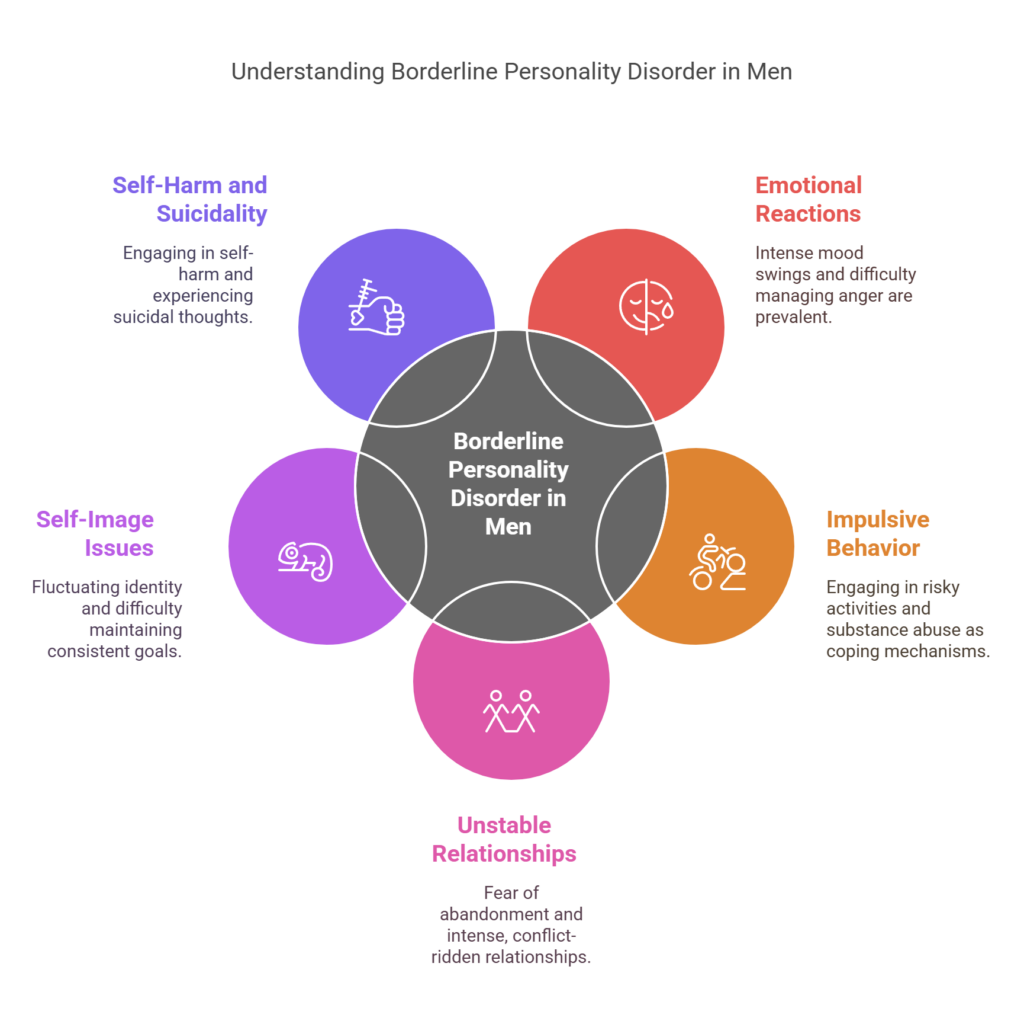Men’s mental health often takes a backseat, but it’s just as crucial as physical health. Too many men silently battle emotional struggles that are easily overlooked or misunderstood. Borderline personality disorder in men is one of those conditions that can deeply affect their daily lives, relationships, and overall well-being. If you’re noticing mood swings, impulsive actions, or intense emotional reactions, these could be signs of something more serious. Don’t wait until things spiral out of control; understanding these symptoms is the first step toward getting the help you need and improving your life. It’s never too early to reach out and make a change.
What Are Borderline Personality Disorder in Men?
Borderline personality disorder refers to emotional disturbances preventing such men from thinking properly, behaving, and functioning. Some of them include depression, bipolar disorders, and disruptive mood dysregulation disorder (DMDD), among others. The most effective treatments are available for patients if their symptoms are discovered on time. 40% of men with borderline personality disorder in men report significant improvements after completing therapy and treatment.
Men can have different kinds of Borderline personality disorder, and in each case, the men face different problems and symptoms. Here’s a brief look at some of the most common ones:
Understanding these disorders is important to seek the right treatment. Borderline personality disorder in men, in particular, can be tricky to treat, but with the right help, improvement is possible.
Borderline personality disorder in men can be difficult to identify, mainly because men often do not show their emotions in the same way as others. 1 in 10 men will experience depression in their lifetime, yet men are less likely to seek help compared to women.

Here are some common signs that may indicate a mood disorder:
These symptoms may be prevalent in men suffering from Borderline personality disorder:
Understanding these signs is key to recognizing when help is needed. If any of these signs sound familiar, it may be time to seek support and consider professional care.
Recognizing the signs of a mood disorder in men can be difficult, as many men tend to hide their feelings or downplay their struggles. Here are some common signs that may indicate a mood disorder:
Understanding these signs is key to recognizing when help is needed. If any of these signs sound familiar, it may be time to seek support and consider professional care.
Treatment for Borderline personality disorder varies based on the type and severity of the disorder. The good news is that with the right treatment plan, recovery is possible. 70% of men with untreated Borderline personality disorder are more likely to develop substance abuse problems. Here are some common treatment options:
If you or someone you know is struggling with a mood disorder like borderline personality disorder in men, reaching out for professional support can make a significant difference.
Many men are hesitant to seek help due to stigma or fear of being judged. However, ignoring the signs of a mood disorder can lead to long-term consequences. Untreated Borderline personality disorder can strain relationships, impact work life, and lead to substance abuse or other unhealthy coping mechanisms.
By addressing Borderline personality disorder early, you can improve your quality of life and mental well-being. Borderline personality disorder in men is treatable, and with the right help, emotional stability can be achieved.
If you suspect that someone close to you is dealing with a mood disorder, there are several ways to offer support:
Remember, the goal is to show that you’re there for them and that asking for help is okay.
At Relevance Recovery, we offer specialized care designed to help men navigate the challenges of Borderline personality disorder. Our approach includes personalized therapy, family involvement, and comprehensive support that focuses on the men’s emotional, mental, and social well-being.
Relevance Recovery is dedicated to providing a compassionate approach that promotes long-term stability and wellness for men and their families.
Borderline personality disorder, including borderline personality disorder in men, can be challenging, but they are treatable with the right support and care. If you or a loved one is struggling, don’t hesitate to reach out. Borderline personality disorder in men doesn’t have to control your life, and with professional help, stability and peace of mind are achievable. Relevance Recovery is committed to helping families find a path to stability and healing. For more information and guidance, consider reaching out to a professional resource today.
Our evidence-based therapies are designed to address emotional health and guide you toward lasting well-being.
FAQs
Men with borderline personality disorder (BPD) may experience intense mood swings, impulsivity, unstable relationships, and chronic feelings of emptiness. They might struggle with self-image, exhibit reckless behavior, and have difficulty managing emotions, leading to frequent emotional outbursts.
Men with BPD may engage in impulsive behaviors like substance abuse or aggression. They often struggle with intense fear of abandonment and may react with anger or emotional withdrawal. Relationships can be turbulent due to these erratic emotional shifts.
In men, BPD can manifest as emotional instability, difficulty maintaining relationships, and self-identity issues. They may struggle with controlling anger, have a history of impulsive decisions, and experience periods of intense emotional highs and lows, often leading to self-sabotage.
BPD itself doesn’t directly affect life expectancy, but individuals with BPD are at higher risk for substance abuse, self-harm, and suicide, which can impact overall health and longevity. Effective treatment can significantly reduce these risks and improve quality of life.